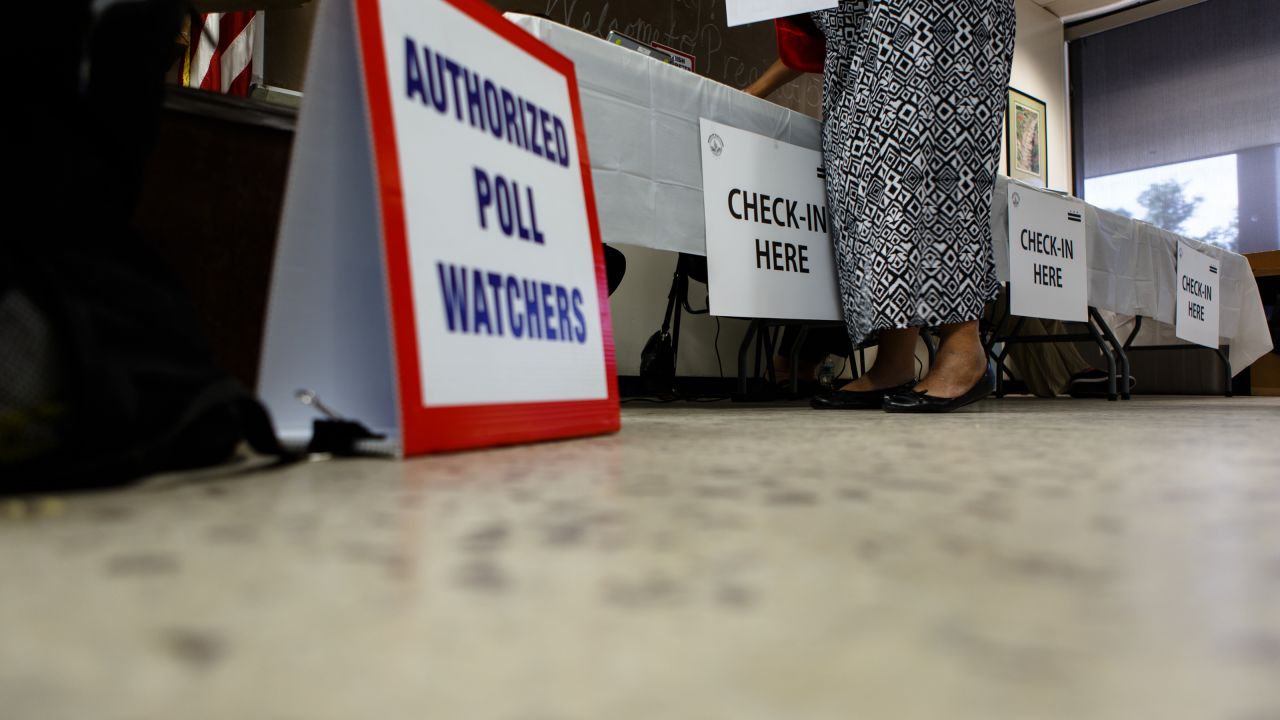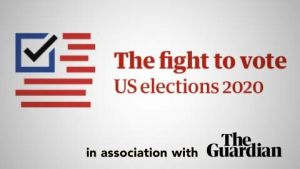
The GOP’s voter-fraud crusade dates back to the 2000 election in Florida. That year, the state wrongly purged thousands of voters from the rolls. Now, poll watchers are stationed at polling places throughout the country, including this one in Washington, DC. (Photo by Keith Lane for The Washington Post via Getty Images)
Donald Trump’s campaign failed to produce any evidence of vote-by-mail fraud in Pennsylvania after a federal judge ordered it do so, according to a 524-page court filing obtained by The Guardian.
The order came from US district judge Nicholas Ranjan, a Trump appointee, earlier this month amid a lawsuit in Pennsylvania over several voting policies. The Trump campaign is suing to block the widespread use of official ballot dropboxes in the state in locations other than an election office, and to allow poll watchers to work in counties other than the ones they live in.
The campaign also wants to block election officials from counting mail-in ballots if a voter forgets to put their mail-in ballot in a secrecy sleeve within the ballot return-envelope. The campaign argued in court that the current practices will lead to voter fraud without these changes.
Ranjan last week ordered the campaign to turn over its evidence of the prevalence of fraud in Pennsylvania, including fraud related to dropboxes and vote by mail. While the Trump campaign cited a handful of mail-in ballot fraud cases in its original complaint, the campaign turned over little evidence of pervasive fraud in its partially redacted response. Certain documents in the filing were designated confidential and withheld from The Guardian.
The campaign also offered no evidence of fraud specifically linked to dropboxes or mail-in ballots. The filing was first reported by Type Investigations. Several studies and investigations have shown that voter fraud is extremely rare.
The campaign’s filing consisted of a half-dozen news articles. Two of the stories dealt with the conviction of Domenick DeMuro, a former Philadelphia election judge who pleaded guilty earlier this year to illegally taking bribes and ringing up votes at the polls.
A third news story highlighted the conviction of Ozzy Myers, a former congressman who bribed DeMuro. DeMuro and Meyers are both Democrats.
The campaign also included a 2018 news release about four election workers who had been charged in 2017 with intimidating and harassing voters at the polls. It also included a news story about legislative hearing earlier this year that quoted two Republican lawmakers asking questions about how to prevent fraud in mail-in voting, but did not offer evidence of it.
The final piece in the document was a 20 May Fox News story highlighting a lawsuit filed by Judicial Watch, a conservative group, alleging that 800,000 ineligible voters could be on the state’s voting rolls. The group has a reputation for distorting data to make inaccurate claims about voter rolls. Pennsylvania and the counties being sued say Judicial Watch’s claims are inaccurate.
The filing also contains numerous public records requests filed in recent weeks to local election officials in Pennsylvania seeking information about the vote-by-mail process in the state, including security protocols in place for drop boxes and how absentee ballots are processed.
John Powers, an attorney with the Lawyers’ Committee for Civil Rights Under Law, which is opposing the Trump campaign in the suit on behalf of civil rights groups, said the evidence the campaign produced was “paltry”.
“The campaign has not provided any meaningful evidence that voter fraud is a widespread problem in Pennsylvania or that there was any intentional misconduct in the state’s June primary election,” he said. “There’s certainly several explosive, salacious claims in the complaint that just aren’t borne out by the facts or what’s been produced. Based on what we’ve seen so far, it seems like a lot of hot air.”
The Trump campaign did not respond to a request for comment on the filing.
The effort to limit dropboxes comes as many election officials are eyeing expanding the practice as an alternative for voters to safely return their ballots without having to rely on the United States Postal Service. Trump has also railed against vote-by-mail, a process experts expect Americans to use in record numbers this year because of the Covid-19 pandemic.
This content is part of our partnership with The Guardian’s Fight to Vote



